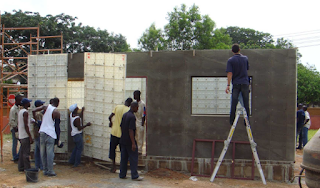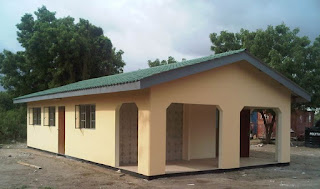The Thusong Service Centre (formerly known as Multi-Purpose Community Centres — MPCCs) programme of government was initiated in 1999 as one of the primary vehicles for the implementation of development communication and information and to integrate government services into primarily rural communities.
This was done to address historical, social and economic factors, which
limited access to information, services and participation by citizens,
as they had to travel long distances to access these services.
Thusong Service Centres are one-stop, integrated community development centres,
with community participation and services relevant to people’s needs.
They aim to empower the poor and disadvantaged through access to
information, services and resources from government, non-governmental
organisations (NGOs), parastatals, business, etc. enabling them to
engage in government programmes for the improvement of their lives.
Government’s vision for Thusong Service Centres is to provide every
South African citizen with access to information and services within
their place of residence and in each local municipality by 2014 with the
purpose of improving the quality of their lives through integrated
service delivery.
By the end of March 2012, 171 Thusong Service Centres were in operation,
making a crucial contribution to the expansion of infrastructure for
access to information and services that citizens can use.
Typical services found in these centres include those from the
departments of Home Affairs, Labour, South African Social Security
Agency (SASSA), Social Development, Government Communications and
Information Systems (GCIS), and the department of Health as well as
telecentres, the Post Office, libraries, agricultural extension offices
and municipal services. Community Development Workers, the South African
Police Service, NGOs and community-based organisations, also offer
services through the centres.
Thusong Service Centre Partners
Harnessing the energy of partners is key to the programme
Building partnerships is a major focus of the Thusong Service Centre
programme. Strong partnerships guarantee sustainable and effective
service delivery at Thusong Service Centres. Partners support all
aspects of the programme, from funding to enhancing the services
provided.
Although the programme is driven by government, Thusong Service Centres
are ideal platforms from which businesses and non-governmental
organisations (NGOs) can offer their services and reach a wide sector of
the market.

June 2015
Each year, on the 17th of May the International Telecommunication Union marks the anniversary of the signing of the first International Telegraph Convention and the creation of this organisation. Read more...
Each year, on the 17th of May the International Telecommunication Union marks the anniversary of the signing of the first International Telegraph Convention and the creation of this organisation. Read more...
Partners at Thusong Service Centres are:
- service providers (government, civil society and private sector)
- government strategic planners/policy-makers (national, provincial and municipal)
- local communities benefiting from Thusong Service Centres
- development agencies
- parastatals
- funding partners
Participation and firm commitment are integral to the Thusong Service
Centre programme. Consequently, partners have the following critical
roles to play:
- Political spheres: Influencing efficient service delivery and participatory partnership
- National, provincial and local government: Strategic planners implement the programme, line departments ensure service delivery
- Parastatals: Critical to infrastructural process
- Civil society, community-based organisations and NGOs: Providing services and resources
- Private sector: Providing services and contributing broader resources.
The Government Communication and Information System (GCIS) provides
overall co-ordination and support, reporting to the Governance and
Administration Cluster and Cabinet Committee. Other government partners
and roles are listed below:
Partners in national government
- National Treasury
- Funding options and strategy
- Alignment of funding
- Public Private Partnership (PPP) strategy for Thusong Service Centres
- Technical assistance with business planning
- Department of Provincial and Local Government
- Co-ordination at provincial, local and district level
- Municipal Infrastructure Grant (MIG)
- Alignment of Integrated Sustainable Rural Development Strategy/Urban Renewal Programme with Thusong Service Centres
- Department of Public Service and Administration
- E-government strategy through E-Gateway Portal
- Legislation re: access strategy, service level agreements, human resources
- Community Development Workers’ alignment strategy
- Thusong Service Centre co-ordination
- Department of Public Works
- Infrastructure advice and roll-out
- Lease agreements at centres
- Department of Trade and Industry - Local Economic Development co-ordinators
- Provision of economic opportunity projects and programmes
- Departments of Home Affairs, Social Development, Labour, Agriculture, and Minerals and Energy
- Roll-out alignment (budgets and infrastructure)
- Service delivery plan at provincial and district levels
- Resource deployment plan at district level (human resources and tools)
- Reporting to national co-ordinator
Partners in provincial and local government
- Premier’s offices
- Co-ordination and governance at provincial level
- Co-ordinate establishment and management of PPP at provincial level
- Alignment with provincial growth and development summits
- Report to national co-ordinators
- Development of proper structures and systems, service level agreements, monitoring, evaluation and support of the programme
- South African Local Government Association
- Co-ordination of district and local municipalities
- District and local municipalities
- Co-ordination and governance of implementation at district and municipal levels
- Provision of centre management and staff
- Alignment with integrated development plans
- Development and implementation of district and local promotional and marketing plans
Other partners
- Department of Communications, South African Post Office, Sentech, National Electronic Media Institute of South Africa, Telkom
- Information and communications (ICT) strategy
- Community radio stations
- Public Information Terminals (PiTs)
- Contribute to intersectoral steering committees
- Universal Service Access Agency of South Africa (USAASA)
- ICT strategy
- Establishment of telecentres
- State Information Technology Agency
- ICT strategy
- Connectivity
- South African Management Development Institute (SAMDI)
- Capacity-building strategy
Many other government departments (national and provincial), NGOs and
private-sector stakeholders support this programme as it intensifies.
Partnership in the programme is worthwhile because:
- information needs of citizens are placed first in the communication process
- people are empowered through participation
- development is based on consultation and strong networks at community level
- a wide-level commitment is followed rather than a top-down process
- you find improved access to services
- there is face-to-face interaction between government and the people
- the centre model suits community needs: hubs for large centres, satellites for smaller centres and mobile units for vast/inaccessible geographic areas.
SOURCE: Department of Communications (South Africa)

